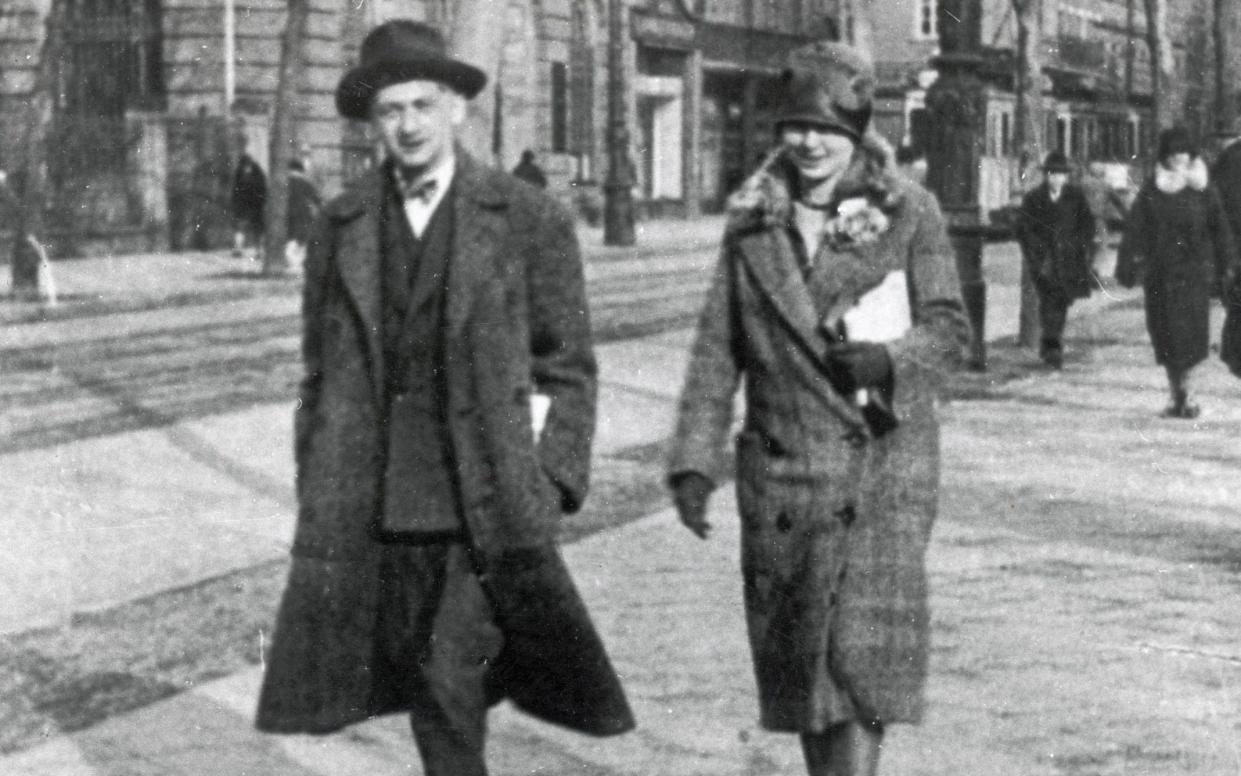Endless Flight by Keiron Pim review: the self-hating genius of Joseph Roth

- Oops!Something went wrong.Please try again later.
If we were to read biographies in order to draw morals, the life of Joseph Roth must come close to being the best example of “never meet your heroes”. Blatant liar, implacable hater (and self-hater), towering spendthrift and flamboyant alcoholic, he turned on almost all his friends, bankrupted at least one indulgent publisher, and drank himself into an early grave in May 1939, aged 44.
To recall that, in the year Roth died, George Orwell published Coming Up For Air and Henry Miller Tropic of Capricorn is to glimpse the ease with which the 20th century could cast a novelist such as Roth aside. His novels, simultaneously elegiac, wistful and laconically matter-of-fact, are often deeply attached to late-imperial Austro-Hungary and its military code, while satirising both. But since his rediscovery in the 1980s, the marvellously well-sprung ride of his prose, its clipped rhythms and heart-rending intensity, its swift storytelling balanced on the blink of an eye between catastrophe and, more rarely, joy, have assured him a reputation among the greatest of European novelists.
Born in Brody in Galicia, now near Lviv in western Ukraine, Roth had father issues (he never saw his father, who lost his reason) which helps explain his attachment to Austria-Hungary and the figure of Emperor Franz Joseph. Brody was not beautiful – a phrase exists in German, “as wretched as in Brody”. Poor Roth felt the Jews of Brody doubly wretched, and thus began his greatest discomfort, that in being Jewish he felt second-class, ugly and homeless.
Keiron Pim’s previous book about the mercurial, self-destructive David Litvinoff, court jester to the 1960s rock ’n’ roll world, is an unlikely but appropriate counterpart to his new biography of Roth. A virtue of his scrupulous account is the generosity with which he acknowledges other scholars, such as Devorah Baum, whose brilliant passage on self-hatred he quotes: “Self-hatred can arise when the face you see in the mirror isn’t the one you want, when the body you wash in the bath isn’t the kind you imagine others want, when you seem to have the wrong accent, the wrong name, the wrong parents… You reinvent yourself… But is this new self really you? Not according to the voice that whispers inside your head: ‘What if the old me resurfaces? What if my mask slips?’”
Yet these tensions were what made Roth a great novelist. In his masterpiece The Radetzky March, Lieutenant Trotta is asked straight out by the regimental surgeon if something’s going on between Trotta and the surgeon’s wife:
“Nothing whatsoever, Herr Regimental Surgeon.” He’s gone crazy, the lieutenant thinks. And: It is shattered! Something is shattered. He feels as if he has heard a dry, splintery shattering. “Broken faith” – he once read that phrase somewhere. Shattered friendship. Yes, it is a shattered friendship.
“Shattering” is a key word in Roth’s work. An old order disintegrating and faith breaking under the pressures of war and civilisation are insistent themes. As Pim points out, Roth fully embodied that shattering. “As well as the drink, Roth had been smoking up to 80 cigarettes a day. Morgenstern [a novelist and friend] studied Roth’s face as he took a sip of cognac: ‘The changes in his face and posture shocked me. He was less than 43 years old, and – my heart won’t forgive me for writing it – he looked like a 60-year-old drunkard.’”
But he was a fighter, too. He recognised Nazism for what it was from the outset, boarding the Berlin-Paris express on the day of Hitler’s appointment as chancellor in 1933, never to return to Germany. And his work magically balances the dissolution and self-hate with its prescience, compassion, lyricism and a continual battle between despair and hope. If you don’t know his writing, read his fable Job or his short, sparkling The Legend of the Holy Drinker. In his book about the displaced Jews of the First World War, The Wandering Jews, he shows a clairvoyant sympathy for the civilised emptiness, and later Holocaust, that awaited many. In The White Cities, his reports from France (as the Frankfurter Zeitung’s highest-paid correspondent), as Pim writes, “Nowhere else does he achieve such a consistent level of limpid beauty.”
So no matter that he lied as easily as he spoke, that he treated women and friends (especially his wealthy close friend Stefan Zweig) appallingly, that his bar bills for innumerable bottles of Hennessy cognac at the Hotel Bristol in Vienna remain unpaid to this day. His fiction may rob us of our illusions, but he singlehandedly, and with an extraordinary storyteller’s gift of elegance and wit, cleared Europe’s literary decks of their 19th-century hangovers and readied it for modernity. This fine biography, with its spirited, shrewd, thorough understanding of its times, shows us exactly what that cost its subject.
Endless Flight is published by Granta at £25. To order your copy for £19.99 call 0844 871 1514 or visit Telegraph Books

